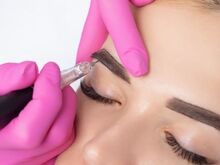Additional income from beauty services
Additional income from beauty services
Question:
Hello!
I work in an international company, where I get insurance. In my spare time, I provide services (permanent makeup, microblading) for which I have rented a room. I hope this will become my main job in the future. Which is the best option for me? Work on a patent, ET or EOOD?
Thanks in advance!

Answer:
Hello,
As you yourself mention, there are three options before you - patent, ET or company. We will try to describe the main differences.
From a tax point of view, things look like this:
- with ET you declare the amount of income for the year. From the amount received in this way, you deduct the insurances paid during the year and on the amount received in this way, you owe 15% tax.
- with an EOOD, you declare the amount of income and expenses related to your activity. If the income is more than the expenses, then you make a profit and this profit is taxed at 10%.
- in the case of a patent, you owe a tax determined by the Municipality in which you will be operating. You will get the most accurate information about its size in the relevant municipality.
From an insurance point of view, the situation is as follows:
- with ET, you are insured monthly, and accordingly you must declare and pay insurance every month, with the minimum insurance income currently being BGN 933.00, which means minimum insurance in the amount of BGN 300.00 per month. At the end of the year when the annual tax return is submitted, an adjustment is made. In this equalization, the realized profit during the year is considered. If the amount exceeds the amount on which you were insured, you must add insurance on the difference. The amount on which insurance is calculated and paid on an annual basis cannot be higher than BGN 45,000.00.
- with EOOD, the insurance is again paid on the minimum insurance income for the year - BGN 933.00, the difference being that there is no annual equalization.
- in the case of a patent, you are insured monthly, as you must declare and pay insurance every month. The minimum insurance income is currently BGN 933.00, which means minimum insurance benefits of BGN 300.00 per month. At the end of the year, when the annual tax return is submitted, an adjustment is also made. Then the realized income during the year is looked at, and if its amount exceeds the amount on which you were insured, insurance must be brought on the difference. The amount on which insurance is calculated and paid on an annual basis cannot be higher than BGN 45,000.00 for 2024
We will note here that you mention that you are already insured. This does not release you from the obligation to self-insure based on your chosen method of work. Your insurance income from the employment contract, however, is included when determining your annual insurance income during the annual equalization for ET and for patent and if the total insurance income exceeds the maximum, then you will owe insurance only on the amount until the maximum insurance income is reached. If you are already insured at the maximum insurance income under the employment contract, then you will not owe insurance, regardless of which work option you choose.
I.e. from a tax and insurance point of view you will need to assess and make some kind of plan regarding expected income and expenses. Only in this way will you be able to determine which form of activity is economically more profitable (ie you would pay less tax and insurance).
Apart from the differences from a tax and insurance point of view, there are also several purely functional differences:
- the money you earn as an ET and as work through a patent is really your money and you can "spend" it whenever and on whatever you want. With an EOOD, the money the company makes stays with the company. If you, as the owner, want to have this money at your disposal, there are several options - to receive a salary, to give yourself a loan, or after the financial year is over and if the company has made a profit, to distribute a dividend to yourself (but you will have to to pay an additional 5% dividend tax on this amount).
- as an EOOD, the company is responsible for its obligations to the extent of its own assets and capital. As an ET and a patent - the company is you, which means that you are personally responsible with all your property for any liabilities arising from your activity as an ET.
- to register for a patent, you must submit a declaration to the relevant municipality. No government fees.
To register an EOOD, the procedure is a little longer and more complicated. A set of documents is being prepared. Some of them are notarized. A fundraising account is opened in a bank and the initial capital is paid in - the minimum is BGN 2.00. With all the prepared documents, an application is submitted to the Commercial Register no later than 7 calendar days from the date of the founding act. The company will be registered within 7 working days. The state fee is BGN 110.00, the notary fee is about BGN 8.00, and the bank fee depends on the bank you choose - it varies from BGN 10.00 to BGN 50.00.
The registration of an ET is similar to an EOOD, with the difference being that a fundraising bank account is not opened and the state fee is BGN 50.00.
- it is important to know that if you reach a turnover for VAT registration, you will not be able to be taxed on a patent and you will have to choose one of the other two options (ET or EOOD) through which you can continue to carry out your activity.
We hope we have been helpful!
Greetings!




